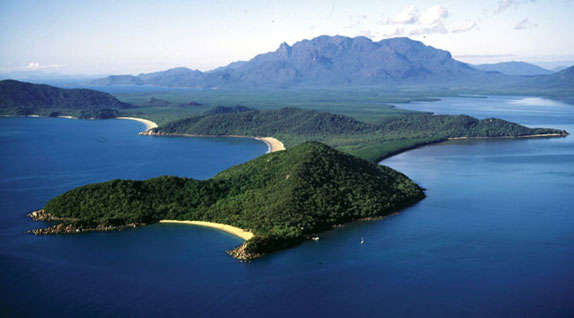 Australian Tourist Commission/Charlotte Observer/MCT
Australian Tourist Commission/Charlotte Observer/MCT
Article
Throughout its history, Australia has enjoyed peace, prosperity and abundance. Is it possible a calamity of epic proportions could soon impact the “lucky country”?
Learn the why behind the headlines.
Subscribe to the Real Truth for FREE news and analysis.
Subscribe NowThe “land down under,” as Australia is often called, is unlike any other country. A vast continent, it is roughly the same size as America’s lower 48 states, yet is home to only 22 million people, and has the lowest population density in the world—only two people per square kilometer.
Australia’s coastline is nearly 31,000 miles and marked by over 10,000 beaches—more than any other nation. As 85 percent of Australians live within about 30 miles of the ocean, beach-going is firmly entrenched in the “Aussie” lifestyle.
The largest coral ridge in the world, the Great Barrier Reef, roughly parallels the coast of Queensland for 1,600 miles. Thousands of visitors flock to the natural wonder each year to observe its pristine beauty. In addition, approximately 400 species of birds exist solely inside the country’s borders, and about 80 percent of its southern marine species can be found nowhere else.
Australia is quite wealthy. While other nations are drowning in a sea of debt, it has generally maintained a balanced budget.
Because of its abundant natural resources, ideal weather, unique history, and location that keeps it isolated from the world’s troubles, Australia has been dubbed the “lucky country.” The Economist ranked Melbourne the third most livable city worldwide. Perth and Sydney also rated in the top ten.
In light of these facts, many dream of visiting Australia at least once in their lifetime—and tens of thousands do so each year, with some remaining permanently. The Aussie lifestyle is perceived as relaxed and enjoyable, and the people friendly.
Yet, as surprising as it may seem, all is not well with the “lucky” country. A storm is brewing, one that will significantly impact the land down under—and much sooner than you would expect.
Unique Past
To many, Australia is merely an ex-penal colony, known mostly for kangaroos, koalas and crocodiles. But the continent’s history dates back thousands of years, to when aboriginals inhabited the country’s vast expanse. It was not until the 16th century, however, that Europeans began exploring the land. Portuguese, Dutch, British and French explorers all made landfall from the 1500s to 1700s, with Portugal considered the first to officially discover Australia. (Some historians believe that Chinese and Arab voyagers may have come in contact with Australia as early as the 15th century.)
Upon a second expedition of Australia’s northern coast in 1644, the Netherlands named the landmass “New Holland.” The Dutch, though, decided not to continue further exploration of the area. England instead took the lead role.
During his second trip to New Holland, English buccaneer William Dampier explored the western coast, some 1,000 miles, from 1699 to 1700. He wrote extensively about his journeys, more than any previous explorer had done. But he was so critical of the people and land itself that England decided not to pursue additional voyages for some time.
In the mid-1700s, hope for commerce and wealth out of New Holland led to a renewed desire to explore the continent. Great Britain took the lead once again and embarked on several explorations. In 1770, English explorer Captain James Cook landed along the eastern coast of New Holland and named the area New South Wales (NSW) on August 23.
The first large-scale settlement of New Holland occurred in 1768, when the British sought to colonize New South Wales. The motivation behind this has been a source of debate. Many believe England settled the land with the intention of using it solely for prisoners, which by that time were no longer able to be sent to colonies in America. Convicts were among the first to settle New South Wales, and official statements confirm this as the chief reason for colonizing the area. Others, however, saw it as a move to establish fortified strongholds in the eastern seas and exert greater influence over the area.
More than 700 convicts and 250 free persons left England on May 13, 1787, to colonize New South Wales, on the southeast coast. The commander of the expedition, Arthur Philip, landed at Port Jackson on January 26, 1788, hoisted the British flag, and began to establish a government.
In the early 1800s, British Naval Officer Matthew Flinders circumnavigated the continent and recommended that the name change to “Australia.” In 1817, it became official: New Holland became Australia.
Throughout the early 1800s, settlements sprang up throughout New South Wales and pushed westward. Local governments formed, and economic development quickly flourished. Men of notable upbringing and wealth were encouraged to migrate to New South Wales and Tasmania. They received large plots of land and were instrumental in leading the way socially and economically.
Convicts also played a large role—both for good and bad. Many were urban thieves; others led decent lives. By 1830, there were roughly 58,000 in Australia. One could easily believe such a large population of convicts would lead to chaos, but this was not the case.
In January 1827, Edmund Lockyer established a permanent settlement at Albany, Western Australia, and stated that England now claimed all of Australia.
The decades of the 1830s to the 1860s were marked by great political and economic change. Colonies were given the ability to govern themselves—large deposits of minerals and gold were discovered—and it was learned that Australia was well suited for producing wool. Christian churches gave considerable financial aid for expansion. Adherents of Catholicism, Methodism, Congregationalism, Presbyterianism and, of course, the Church of England, which had the most converts, quickly populated the nation.
The Australian European population passed 50,000 in 1825, 450,000 in 1851, and 1.15 million in 1861. By 1901, it shot to 3.37 million. The remaining four of Australia’s six colonies were created during this time: Western Australia, South Australia, Victoria and Queensland. But each remained independent of the other throughout the 1800s.
The colonies eventually united with the signing of a national constitution on January 1, 1901, giving birth to the Commonwealth of Australia. Each colony relinquished limited areas of power to the federal government, such as external affairs, defense, immigration, customs and marriage laws. A high court was established to interpret the constitution. The British monarch was—and still is—officially the head of state, but Australia has been essentially independent since its formal inception.
With no war leading up to it—and none to follow thereafter—a nation was born. Australia all but stands alone with that distinction.
Economic Expansion
Fast-forward to the 1940s: Australia became involved in World War II, with soldiers and seamen fighting in fronts throughout the Mediterranean and North Africa, and eventually closer to home in New Guinea. This period forged a close bond between the U.S. and Australia, with the two fighting together against the Japanese at the Battle of the Coral Sea—a turning point of the war. Thereafter, the two nations fought side-by-side in a number of land battles. American soldiers became quite common in state capitals throughout Australia, with United States General Douglas McArthur establishing his headquarters in Melbourne and Brisbane. To this day, the U.S. and Australia remain close allies.
The war sparked Australia’s economy and led to prosperity for many of its citizens. Industrialization reached new levels. War-related goods, such as ammunition, planes and machine tools, drove the economic upswing. Employment in cities was high, with many families having at least two members earning income—something previously unheard of. Between 1938 and 1939, and 1942 and 1943, the gross national product rose more than 50 percent. Many Australians began to enjoy wealth, even affluence.
Economic expansion continued through the 1970s, a period that has been called a golden age of sorts. Population and individual expenditures nearly doubled. Automobile ownership increased eight-fold. Manufacturing rose considerably, with output per worker increasing and work hours decreasing. Goods included iron and steel wares, electronic and electric items, and automobiles. Australia began producing its own car—Holden—in 1948.
Today, Australians overall enjoy a comfortable lifestyle and an abundance of modern conveniences. A 2000 United Nations survey ranked the nation fourth in terms of quality of life worldwide. In 2009, it jumped to number two—out of 174 countries. This ranking was based on a survey that evaluated social and economic welfare. Compared to other nationalities, Aussies enjoy easy access to education, long life expectancy and low crime levels.
But as is the case with any country, Australia has its share of problems, including a number of domestic and economic issues.
Debt and Vulnerability
Australia has long been thought of as a nation heavily dependent upon agriculture and foreign investment. This idea was certainly fitting in the early years of European settlement, as wool exports drove the economy. Wheat, beef, lamb, dairy and various irrigated crops were also crucial. But after World War II, the growth of the manufacturing sector lessened Australia’s agricultural dependency.
The nation still relies on foreign investment and is vulnerable to world market fluctuations. Australia’s economy is dominated by outside interests, including those of the UK, U.S., Japan and various large corporations. In light of its rapidly expanding manufacturing segment, China recently invested considerable capital in securing raw materials in Australia.
China is the nation’s largest trading partner and has been a major factor as to why Australia has thus far avoided the recession plaguing other economic powerhouses. The Asian giant’s buying spree of coal and iron ore made Australia the only major world economy to record export growth during the financial crisis.
But there is a risk to this partnership. If prices begin to rise, China could stop buying raw materials and instead tap into its large stockpiles—and there are indications that this is beginning to occur. If prolonged, the results could be catastrophic for the Australian economy.
Australia is also battling increasing national debt. Though not nearly as steep as other Western powers, it is forecasted to reach AUD $70 billion (USD $61.8) by 2012. This is troublesome to a nation that has rarely been in the red. But the economic slowdown has led to increased borrowing to avoid a collapse.
Scorched Land
Australia has long been a bastion of extreme heat and dry conditions. Recent months have proven no different. Record temperatures swept across much of southeastern Australia in late 2009, with September and November being the warmest in Sydney in 150 years. November was the warmest on record in much of southeastern Australia. The unprecedented heat, coupled with high winds and a prolonged period of drought, led to an unusually high number of bushfires across the region. In February 2009, nearly 200 residents in the state of Victoria were killed in a bout of bushfires that raged for several days.
As of late November, 73.6 percent of New South Wales was in a state of drought, with only 1.9 percent of the state considered “satisfactory.”
The Primary Industries Minister said, “These figures illustrate the tough conditions in country NSW, with almost the entire state now feeling the effects of this relentless dry. Not even coastal areas of NSW have escaped—they are either drought-declared or suffering marginal conditions” (The Sydney Morning Herald).
Not surprisingly, these conditions have adversely affected the state’s cotton and wheat crops, in addition to farmers who raise sheep and cattle. As of this writing, forecasters are predicting a warmer and drier than average summer, raising even more fears about the effects.
Awash with Vice
Like other nations of the West, Australia is awash with immorality of all kinds. Premarital sex, drunkenness, drug use, pornography, and other vices plague the country—yet few seem to mind. Today’s young people seem to believe they were put on Earth for one reason—to party night and day. Perhaps no Australian event epitomizes this more than “Schoolies.”
 Sergio Dionisio/Getty Images
Sergio Dionisio/Getty Images Sergio Dionisio/Getty Images
Sergio Dionisio/Getty Images
Schoolies is an annual, week-long celebration—or more aptly, debauchery—seen as a rite of passage for those who just graduated high school. It came to fruition in the 1970s at Broadbeach, a coastal town just outside Brisbane. Since the 1970s, thousands of high school graduates have celebrated it at coastal areas throughout the country. Many youths consider Schoolies the most significant event of the year.
But where young people gather in mass, there is almost always violence and immorality at its worst. Schoolies is widely considered a weeklong binge-drinking party, filled with violence, rampant casual sex, rape, sexual assault and downright debauchery. As many as 75 percent who attend get drunk every night—and many every day and night. Drugs are widely available, with as many as 25 percent of party-goers high on marijuana for most of the week. The hallucinogenic stimulant Ecstasy is also a popular choice for young thrill-seekers.
It should come as no surprise that sales of the morning-after pill spike during the celebration.
With so much drunkenness and drug use, violence is a big issue. Large fights of intoxicated men and women erupt on the street nearly every night, and vandalism of hotel rooms and private property are commonplace. In response, police greatly increase their presence on the streets during Schoolies.
This behavior is not limited to one week only at the end of the school year. Drunkenness and resulting violence are commonplace in Australia throughout the year.
In late spring 2009, authorities initiated a campaign called “Operation Unite” to combat alcohol-related weekend violence throughout Australia and New Zealand. During the first Friday night of the operation, 516 charges were levied against 333 people in New South Wales alone. Offenses ranged from assault to robbery to drug possession. There were 142 arrests in Western Australia and 98 in Victoria that same night. In Queensland, police visited 867 establishments that served alcohol. They found 101 infractions and doled out 156 liquor law infringements. Seventy-three people were arrested for driving under the influence of alcohol.
Looming Crisis?
Many Australian citizens have enjoyed a prosperous life—and continue to do so today. Given its relatively peaceful history and that it was not founded by violent revolution, it has managed to avoid large-scale internal and external unrest.
Australia does have its share of issues though—droughts and bushfires, economic pressures, alcohol-related violence and immorality. But compared to the scope of problems facing other affluent nations of the West, Australia’s appear relatively minor. Therefore, it is easy for most to remain complacent and assume no serious harm could come its way.
Yet serious trouble is headed the nation’s way—and hardly any discuss or are even aware of it.
Australia’s looming crisis was foretold long ago in a book few any longer take the time to read. Hardly any seek guidance from it, change their ways and obey the God who inspired it. And fewer yet comprehend the sheer scope of the coming calamity.
The Bible is God’s recorded revelation of His purpose for mankind. It is the written record of how He intends to work with all humanity—all people who have ever lived. This Master Plan directly collides with the plans of modern Australia, America, Britain, Canada, New Zealand and certain other Western countries—who are actually the descendants of ancient Israel.
Grasp this! Awesome, earth-shattering events are prophesied for Australia in the near future! A crisis that defies imagination is coming upon this country!
Invariably, though, religious leaders explain that Australia, America, Britain, Canada and New Zealand are merely Gentile nations, thus believing that end-time prophecy disregards these great nations. Deceived, they usually focus on prophecies describing the Jewish people, while remaining completely ignorant of the enormous understanding available to those who know where and how to find pivotal knowledge, missing in today’s world, about the identity of the Anglo-Saxon peoples of the West. These “leaders” simply do not know where, how—or what—to look for. Therefore, the answers remain elusive.
The income and standard of living for most Australians and other Westerners is far higher than those residing in most other industrialized nations. But these citizens have forgotten where such blessings originated! Only God’s promises to Abraham kept these Western nations from joining the Third World’s “brotherhood of poverty.”
Now, God is turning Himself from them. And He is removing the wonderful blessings bestowed on them through Abraham’s obedience. Recent world developments evidence their decline—at least to those who are closely watching.
Nations of the West—Australia included—have forgotten God. They have dealt falsely with Him—no longer recognizing that He is the great Provider.
Due to this national rebellion and ingratitude, He is withdrawing His incredible, prophesied blessings from us—the modern nations of Israel. Soon He will cause our peoples (Australia, America, Britain, Israel, Canada, New Zealand and certain Western European nations) to suffer horrible national punishment.
The very blessings now taken for granted by us will be completely stripped away. We are already witnessing this, albeit in a limited fashion right now. But this will change. Soon, the entire country—and world—will be caught in a snare (Luke 21:35)—caught completely off guard by the terror to come.
What about you? Will you heed God’s warning?
To learn much more about the future of Australia and other Western nations, read David C. Pack’s book America and Britain in Prophecy.
More on Related Topics:
- ‘It Was Dead People Everywhere’: Inside Australia’s Hanukkah Massacre
- Australia Will Recognize a Palestinian State, Prime Minister Albanese Says
- Australia Is Banning Social Media for People Under 16. Could It Work?
- Is Religion Dead in Australia?
- Inquiry Finds 200,000 People Were Abused in Care in New Zealand Over Decades in ‘National Disgrace’



